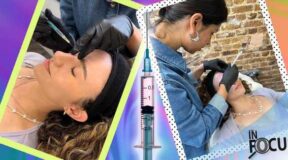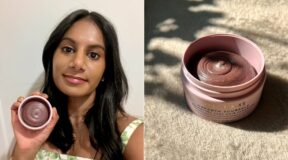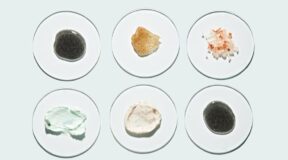Everyone has a skincare tip they swear by and are ready to share. Your mom, your best friend, that girl on Instagram who highlights her entire morning and evening routine. The suggestions are endless, but it can be pretty difficult to suss out which are the best and safest strategies for better skin, right?
If you're not the type that wants to trial-and-error your way to healthier skin, we get it. That's why we asked several dermatologists to dole out their best advice for keeping your skin healthy, glowing, and at its best. And the best part? They made it easy, sharing simple tips for better skin — nothing too fancy. Keep scrolling for their non-negotiable tips.
1. Don’t Skip the Sunscreen.
"The act of applying SPF every day, regardless of skin tone, type, or color, is the single most important preventative step that anyone can take to protect themselves," says Dr. Corey L. Hartman, a board-certified dermatologist and member of the Paula's Choice Advisory Board. "Ultraviolet light causes photo-aging, sun-related pigment changes, sagging from collagen breakdown and skin cancer more than any other environmental or genetic factor."
"On top of the protective benefits concerning skin cancer, sunscreen is the single best anti-aging ingredient you can use," says Robert Finney, a board-certified dermatologist at Entière Dermatology.
Dr. Ranella Hirsch, a Massachusetts-based dermatologist, says if it's light enough outside to see, then you need to apply sunscreen before heading outside. So essentially, SPF is necessary every day, rain or shine.
2. Use an Antioxidant Serum.
Dr. Rita Linkner, a board-certified dermatologist and founder of RVL Skincare, recommends using an antioxidant-based serum every day to protect against everyday aggressors from the environment.
You should apply antioxidants under sunscreen each morning, says Dr. Tina S. Alster, director of the Washington Institute of Dermatologic Laser Surgery. One of the most popular antioxidants is vitamin C. "Topical vitamin C clears away damaging free radicals in the skin, as well as enhances the sun protection effect of sunscreen," she says.
3. Exfoliate.
"I think that everyone should exfoliate with a chemical exfoliant at least three times per week," says Dr. Hartman. Chemical exfoliants offer a gentler form of exfoliation than scrubs that's tolerable for most skin types, including sensitive ones. Consistent exfoliation can offer a smoother, clearer, and brighter complexion.
Another form of exfoliation is chemical peels, which if you ask Dr. Kenneth Mark, a cosmetic dermatologist, and Mohs skin cancer surgeon, he says in-office chemical peels are "the unsung hero of dermatology."
"They exfoliate and give skin a radiant glow," he says. "When performed consistently over time, they also stimulate collagen to decrease fine lines and wrinkles."
4. Use a Retinol.
Retinol is a powerhouse ingredient that can help target signs of early aging and dark spots. Dr. Alster, who is also a clinical professor of dermatology at Georgetown University, says applying a retinol product before bed each night can help repair your skin while you sleep. Dr. Linkner agrees and says, "there is no better way to tackle sun damage and acne."
5. Avoid Overly Hot Showers.
While a hot shower may feel amazing, it can dry out the skin and strip it of its natural oils, potentially causing itchy skin. "The healthiest water temperature is lukewarm or close to room temperature," says Dr. Loretta Ciraldo, a Miami-based board-certified dermatologist and founder of Dr. Loretta Skincare.
Pro tip: if you have dry skin, you can use your lukewarm showers to rehydrate the skin. "A good rule of thumb is to stay in the shower until your fingertips look 'wrinkled'", says Dr. Loretta. "This crinkling of our skin surface is the result of considerable absorption of water, so it is a sign that you have rehydrated your skin."
VIDEO: The 7 Skincare Trends Everyone Will Be Talking About in 2022
6. Keep Your Skin Hydrated.
Keeping the skin hydrated is key in achieving a smooth, plump, and youthful-looking complexion. Dr. Hirsch says the best way to hydrate the skin is to apply moisturizers on damp skin. This method of application prevents transepidermal water loss and makes moisturizers most effective.
Another way to keep the skin hydrated is to drink plenty of water throughout the day to stay hydrated inside and out, says Dr. Brian Hibler, a board-certified dermatologist of Schweiger Dermatology Group in New York City. "Hydrated skin appears smoother, softer, and radiant, giving a more youthful appearance."
7. Choose Water-Based Products.
Dr. Hirsch recommends using water-based hair care products. Yes, hair care. "Oil and wax-based hair care can lead to breakouts especially around the hairline, and we see this especially frequently in the summer," she says.
8. Add New Skincare Products Slowly.
"Don't overhaul your skincare routine all at once," says Dr. Finney. "Start conservatively with a few products that suit your skin type or concerns (note: everyone needs a gentle cleanser, sunscreen, and moisturizer at a minimum) and only add one product at a time." This way, you'll be able to pinpoint any products that cause irritations or changes to the skin.
9. Stick With What Works for You
Just because it's trendy doesn't mean you have to try it. Dr. Hirsch says if you have a skin routine that works for you, stick with it and adapt the formula for changes like the seasons.
"Skincare should be fun but doesn't have to be overly complex," adds Dr. Hibler. "Some people can get away with a complicated, multi-step skincare regimen, but for many others (like those with sensitive skin), products should focus on their specific concern." Not only does this prevent potential irritation or clogged pores, but it also makes the regimen easier to follow and commit to, he adds.
10. Be Patient.
"Improvements in skin conditions like acne or hyperpigmentation are seen gradually, often over weeks to months," says Dr. Hibler. "Patients often get frustrated by a lack of improvement after using a treatment for one or two weeks, and they dismiss it as ineffective, but in reality, they just needed to give it more time."
Source: Read Full Article





